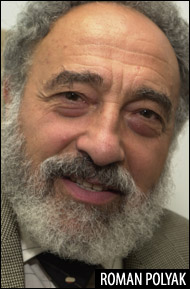September
2001 |
||
 |
Polyak Travels a Hard Road to the FulbrightBy Robin Herron "Here I am, a Russian emigrant, who came to the United States only 13 years ago, and I am going to Israel to represent the United States!" exclaims Roman Polyak, professor of mathematics and operations research and winner of a Fulbright Scholar award. Through the prestigious Fulbright program, Polyak will lecture and conduct research at the Technion, the Israel Institute of Technology, for six months during the next academic year. Polyak, who has been in the United States since 1988, jokes that his claim to fame is "the strongest Russian accent on campus." Although he maintains his sense of humor, all has not been easy for him in his personal or his professional life. He likened his last 10 years in the former Soviet Union to being in "a big jail." During those years, he applied every six months for a visa to emigrate but was refused. Because he was classified a "refusnik," he was denied the right to teach, publish, or even attend professional conferences. To help keep his reputation alive when he was effectively cut off from his peers, Polyak smuggled a scholarly paper out of the country, the penalty for which if caught was prison. But the risk paid off. On the recommendation of a colleague who read the paper, Polyak was offered a job at IBM's T.J. Watson Research Center, where he became a principal investigator for a joint IBM and National Aeronautics and Space Administration study. "So much of my life was wasted," Polyak laments, but he admits that his isolation allowed his mathematical work to take a path different from that of most of his contemporaries. He developed a modified barrier functions (MBF) theory, which has become a widely recognized and important tool for solving difficult real-life nonlinear optimization problems. Ilan Adler, a colleague from the University of California at Berkeley, met Polyak in 1988 at a mathematical workshop in Maine. According to Adler, Polyak, who had been in the United States for only two days, "gave an unplanned lecture in broken English using only one slide with about 50 equations on which he kept piling up more equations. Even though I could hardly understand his lecture, it was quite clear that the speaker was a true intellectual scholar." Ariela Sofer of George Mason's Systems Engineering and Operations Research (SEOR) Department vividly recalls meeting Polyak at that same conference. "It was a hot summer day, and Roman appeared over the horizon wearing a black suit and carrying a heavy suitcase. He asked me in very heavily accented English where the conference was." She wasn't on hand for his impromptu lecture, but says she can imagine what it was like. "He is so immersed in math," says Sofer. "He lives math." Sofer met Polyak again at another conference and found out more about him and his work. "He sent me some of his papers--they were impressive," she recalls. She arranged for him to speak at George Mason and introduced him to Carl Harris, the SEOR chair at the time. Harris eventually obtained funding to bring Polyak to the university in 1993. Over the years, Polyak has transformed his original work on MBF into the nonlinear rescaling principle (NRP) for constrained optimization, providing an effective technique for processing large-scale nonlinear problems that arise in engineering. Recently, Polyak teamed up with Ph.D. student Igor Griva, a fellow Russian who developed computer software based on the MBF/NRP theory. Polyak says that over the past four years, Griva and he have put "hundreds of hours" into developing an efficient tool for solving nonlinear optimization problems. David Shanno, professor at the Rutgers Center for Operations Research who supported Polyak's nomination for the Fulbright, wrote that Polyak and Griva's work "has led to the most robust algorithm for nonlinear programming I have encountered. This is a major accomplishment, as problems which as recently as one year ago were viewed as intractable are now being solved quite accurately with their code." In addition to commendations on his research, Polyak also receives praise for his teaching and ability to inspire his students. Says Karla Hoffman, the current SEOR chair, "In all of his courses, he is patient, thorough, and so totally in love with the subject matter that students perform at a very high level." |
|